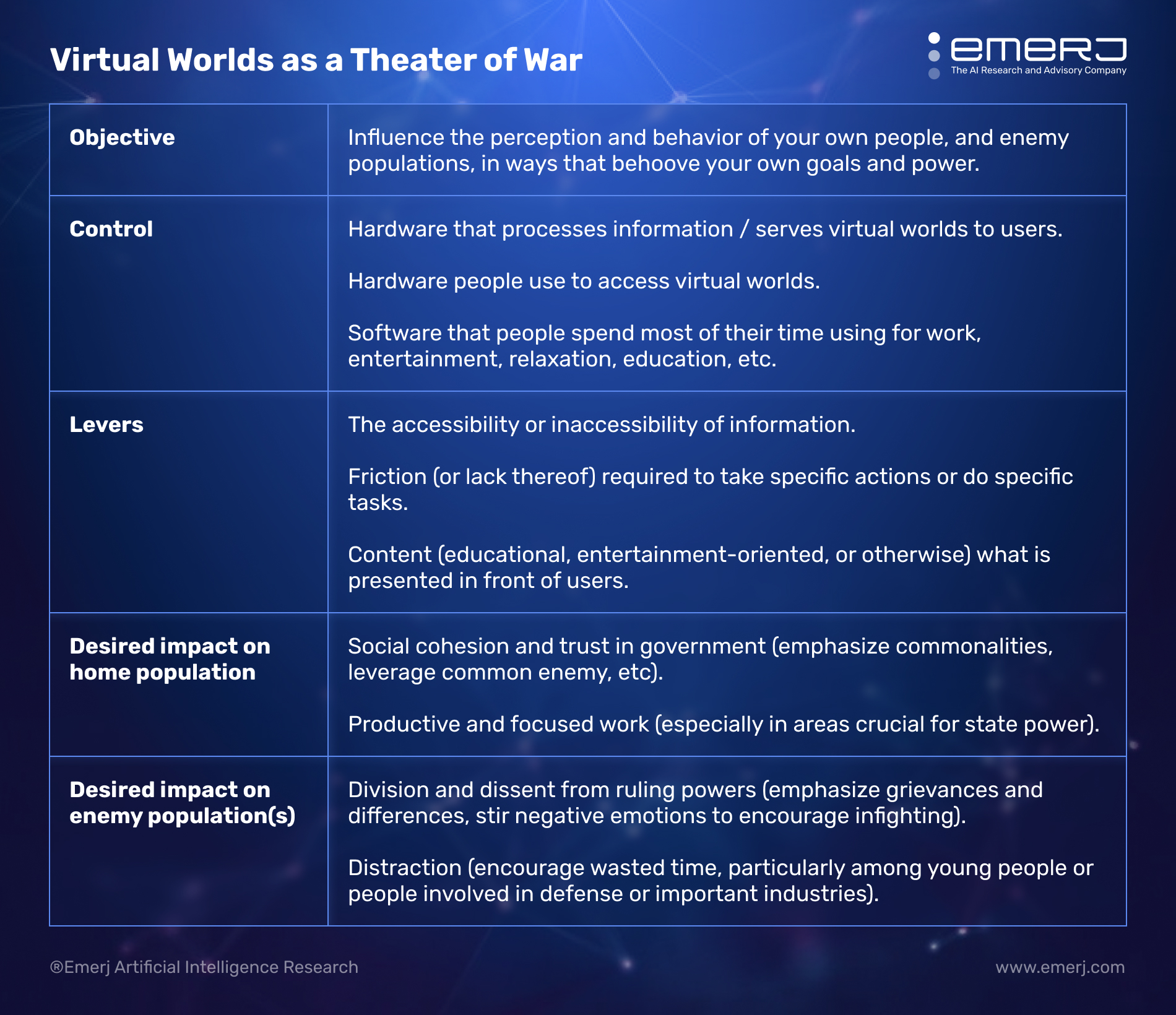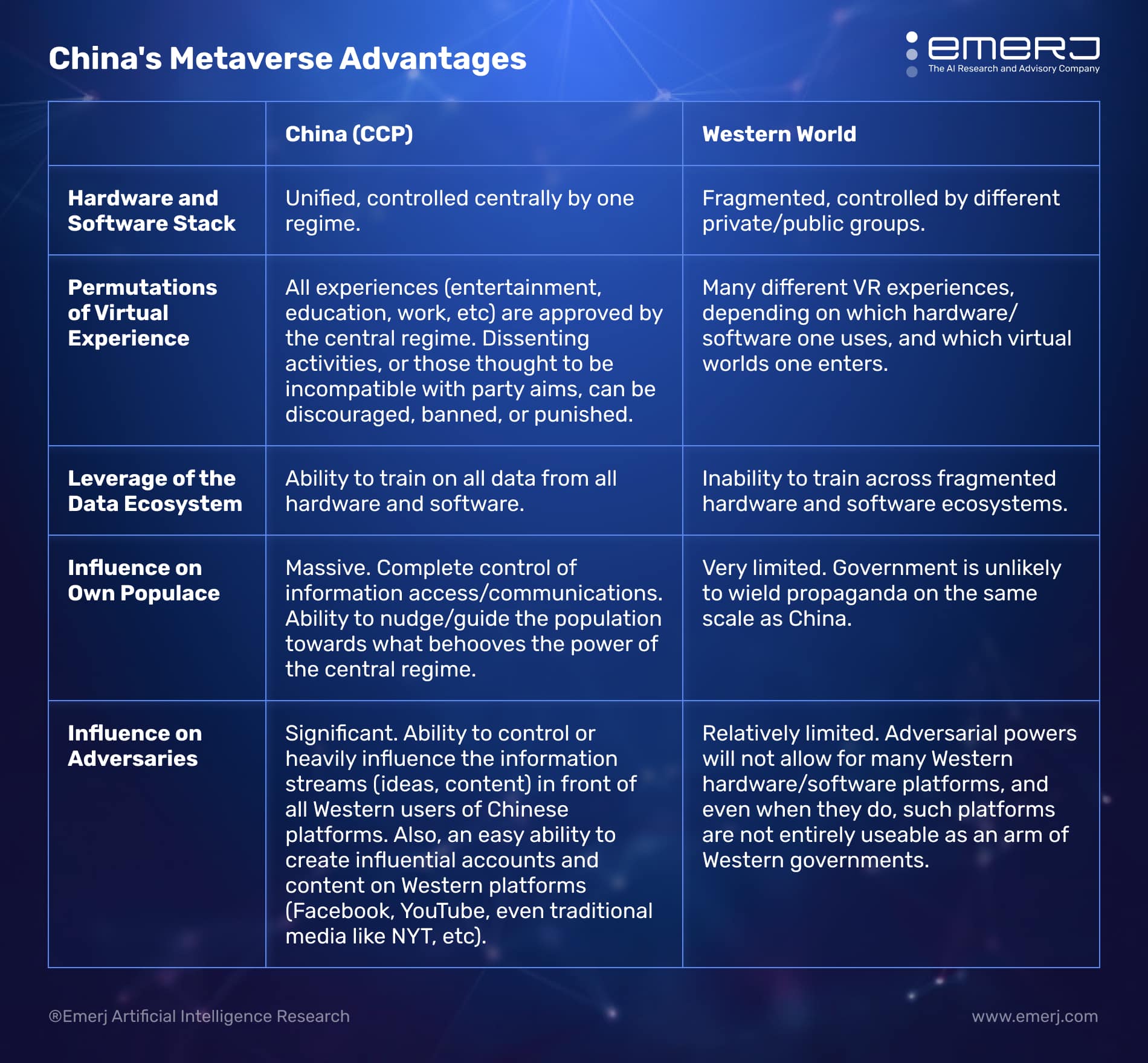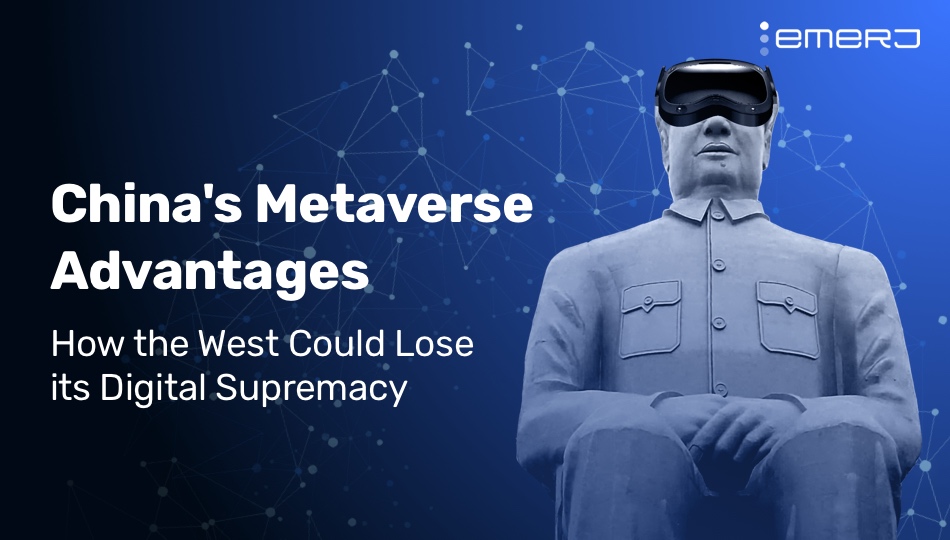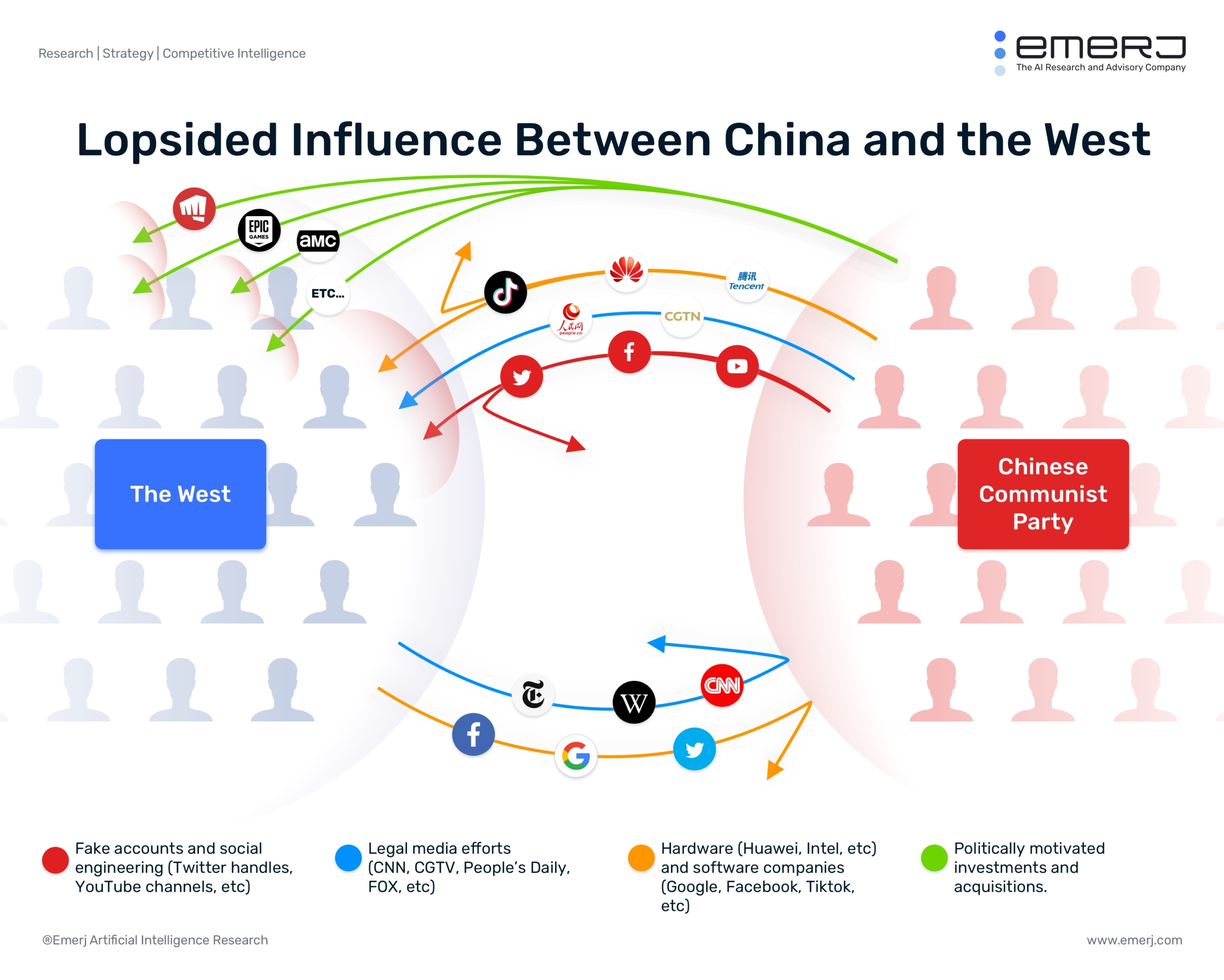When Facebook bought Oculus in 2014 for over a billion dollars, it was an investment ahead of its time. For years virtual reality remained an interesting novelty and little more.
However, as investment in AI has skyrocketed in the last eight years, web3 has similarly become a behemoth of funding. Silicon Valley hardly looks the same as it did a decade ago: Facebook completed its rebrand to Meta, and Apple, Alphabet and Microsoft each have their own virtual reality platforms and business goals. Virtual worlds are back on the radar in a big way.
VR will be about more than gaming, and will likely become an integral part of our daily lives. McKinsey estimates that VR worlds could generate $5 trillion in economic activity by 2030. The virtual world will not only be where we live and work — it will be where social, economic and military power is exercised.
In this article, we’ll explore China’s power advantages — and the West’s potential responses to this power — in the following sections:
- 1 – Virtual Worlds as a New Theater of War: The increasing importance of virtual worlds and communication channels as a means of covert and overt influence.
- 2 – China’s Metaverse Advantages: Distinct advantages that China’s authoritarian regime has in wielding influence in virtual worlds, and how our open systems remain vulnerable to that influence.
- 3 – Evaluating “Western Values” in a Virtual World: A frank assessment of how our Western values may need to be manifested in new ways in order to prevent exploitable weaknesses.
- 4 – Policy Considerations, The West Looking Forward: What the West should consider as next steps as China’s metaverse advantages mount, and as the virtual world becomes predominant.
Throughout this article, I’ll be drawing directly from quotes from leaders in business, policy, and defense – some of which have been pulled directly from recent interviews on The AI in Business Podcast.
1 – Virtual Worlds as a New Theater of War
Fifteen years ago, most economic “value” was found in the physical world. Today, value is changing with where we spend our time — and increasingly starting in earlier stages of life. According to a 2020 study conducted by Dr. Michael B. Robb of the nonprofit Common Sense Media:
- Children and young adults aged 8-18 spend 9 hours per day in front of screens, an increase of 1.5 hours on average from studies taken in 2010.
- The same 2020 study found that, from birth to eight years old, children spend an average of 2.28 hours per day in front of screens.
The shift into the virtual world is simply and extension of our current transition into the digital world. Many of us with white collar jobs spend 10 hours a day on screens at work, and another four or five hours a day on screens for entertainment.
It would be ridiculous to expect anything but more virtual immersion in these future generations of workers, leaders, and citizens.
Can you imagine any of the following numbers shrinking in the coming decade?
- Percent of waking hours looking at screens (any age group)
- Percent of screen time spent engaging with content manifested by AI (TikTok, YouTube, Facebook and any other platforms where content is conjured algorithmically)
- Percent of income or revenue spent on purely virtual products and services
- Percent of completely remote workers
- Percent of relationships started from online dating (any age group)
With work, play, time and attention being poured more and more into the digital ecosystem, it has increasingly become a place where political and military power is exerted – as many examples over the last six years might attest:
- The widely reported Russian interference in 2016 US presidential elections.
- China’s ongoing cybercrime theft of intellectual property from US enterprises (and the US’s congressional and technical efforts to combat it).
- The Cambridge Analytica scandal, and accusations of Meta’s role in the genocide in Myanmar
- The inordinate influence of China’s own state-controlled media sourced across Google and YouTube’s search results (for hot-button issues such as the origins of COVID-19).
- Google’s 2022 removal of tens of thousands of CCP-backed YouTube channels involved in a coordinated influence campaign for Western citizens.
We should expect the following dynamics to hold true when it comes to cyber warfare and digital influence between nations:

The internet started bifurcating as soon as China broke away from US search and social platforms – and will likely only continue to do so. By maintaining control of the media and information ecosystem of its own citizenry, it retains the ability to wield tremendous influence on other nations. As former Google CEO Eric Schmidt stated during a 2018 Village Global VC event:
“I think you’re going to see fantastic leadership in products and services from China. There’s a real danger that along with those products and services comes a different leadership regime from government, with censorship, controls, etc.
Look at the way BRI works – their Belt and Road Initiative, which involves 60-ish countries – it’s perfectly possible those countries will begin to take on the infrastructure that China has with some loss of freedom.”
— Former Google CEO Eric Schmidt
And soon, screens alone will not be the only way this bifurcated internet can manifest in our lives, it will be immersive virtual worlds. I’ve posited that in the remaining part of the 21st century, all competition between the world’s most powerful nations or organizations (whether economic competition, political competition, or military conflict) is about gaining control over the computational substrate that houses human experience and artificial intelligence.
Owning the substrate that houses the virtual world (i.e. that pipes reality into the headsets of humanity) is as much power as any group on earth could ever hope to obtain. Such a world under China’s control would be very different than one in the West.
China benefits tremendously from its current one-way digital influence. In fact, that lopsided influence could be argued to be the keystone of China’s advantages in the metaverse.
AI ethics thinker Nell Watson is Chair, Human or AI Interaction Transparency Working Group for the IEEE, and serves as Executive Consultant Philosopher at Apple. Watson is concerned with the potential for authoritarian regimes (public or private) to leverage media control in a way that distracts populations, or pulls individuals away from meaningful work.
In speaking her in preparation for this article, Watson spoke directly to the very real (possibly irresistible) appeal of digital distraction as a covert power influence at a national level:
“We’re now entering an era where content will be increasingly created by machines, but also enhanced, re-mixed, and ‘sexed up’ by machines. And that can potentially create a supernormal stimuli – something that is unnatural and irresistible.”
She likens this immersive future of AI-generated content to a cheeseburger – full of fat and cheese and salt – fat beyond anything our human ancestors would have encountered in our evolutionary past. Referring to social media drama and TikTok videos Watson says “our lives are already full of digital cheeseburgers.”
2 – China’s Metaverse Advantages
While overall venture funding is significantly stronger in the West compared to China, China’s AI research publishing has grown to nearly outpace that of the United States in the last 5 years. China is also organizing the development of the virtual and augmented reality industries on a national scale than any Western nation today.
But China’s ability to wield power relies on more than research output and venture funding. As covered in our robust article on the international AI race – China maintains other advantages in emerging technologies, including:
- The ability to wield the private sector as an arm of the authoritarian regime’s will.
- The ability to think long-term about technological predominance, unhindered by human rights concerns or other barriers to power.
- The US’s preoccupation with political infighting and relative inability to criticize foreign powers (for fear of appearing xenophobic).
For the sake of this article, we’ll focus primarily on China’s advances in the digital and virtual world as a whole. We’ll begin with a rough comparison between the CCP and the Western from the standpoint of metaverse capabilities:

A huge portion of the advantages that China holds lie the one-sided media and data influence it wields. In the Western world, we face immense challenges across the board:
- China is collecting tremendous amounts of data on Western citizens, using TikTok as a channel for data access and propaganda influence.
- China can create a constant stream of influence through Western media and social media channels – everything from encouraging division to pushing the CCP’s narratives (denial of the Uighur genocide, diverting attention away from the police state in Hong Kong, etc). This is achieved by creating anonymous users, but also by establishing China’s state-run media on Western platforms like Twitter, YouTube, and others.
- Western social media is banned in China, with citizenry residing in carefully curated experiences that ultimately limit their collective influence. Even Wikipedia and other media sources are throttled to only show Chinese citizens the information that the government wants them to access.
Mike Brown, until recently the Director of the Defense Innovation Unit, published a 2018 white paper on China’s technology transfer strategy – including aggressive IP theft around computing hardware and AI-related technologies. During our 2021 interview with Mike he talks about China’s overt current initiatives to control it’s own population:
“They see (technology and media) as a way to ensure that the regime stays in power, and turning China into a kind of surveillance state, and you see that manifested as being a surveillance state – and you see that in the treatment of the Uighurs and the loss of freedoms that those people have endured. But this is also happen in China’s own major cities…
…They want to know what every person is doing at any given time. Now there is the technology in place to do that – to understand that people’s conversations are about – and to ensure that they aren’t in any way going against the ruling party.”
The West faces an adversary with the ability to mold the minds of its own citizenry (with careful monitoring of all virtual spaces and ideas) in ways that behoove its power — while also influencing Western citizens in ways that harm our prospects at power and defense.
And if China has any substantial lever at all in terms of media and influence in the Western world, it’s TikTok — their wildly popular social media platform — and inroad to hundreds of millions of Western users. The growth of the app has been staggering. Last month, the app reported that a billion accounts actively use the platform every month.
In China, TikTok is known as DouYin. The platforms are largely similar, with DouYin (the more mature of the two) having more features available to users – including long-form video and eCommerce purchases.
The two platforms give China the ability to create different ecosystems and user experiences. While there are no public studies comparing the substance of content on TikTok versus DouYin, China’s DouYin seems to be focused more on educational content., and In a more overt sign of this trend, the platform prevents users under the age of 14 for using the app for more than 40 minutes per day — incentives that probably hurt DouYin revenues but help the Chinese Communist Party mitigate the health, social, and political risks of AI.
TikTok users are more likely to be inundated with viral dance videos and political protests. The platform has become so popular that politicians (for better or worse) are turning to it as a channel of influence – giving China a huge trove of data on how to influence American politics.
China obviously maintains the ability to remove or flag content that doesn’t behoove its own interests (such as information about the Tiananmen square massacre).
3 – Evaluating “Western Values” in a Virtual World
Praying to the god you want to pray to. Raising your children the way you want to raise them. Having freedom to be in relationships with who you want, how you want. Affiliating with groups that you like, and causes you support. Choosing your own career and life path.
Most of us would agree, regardless of whether “right” or “left” on the political spectrum, that these freedoms are important and maintaining some version of them in the coming age of virtual reality is crucial.
Amidst our infighting — our white-hot racial, gender, political divisions — Americans are apt to forget that the freedom to argue our side is not self-evident. Freedom does not exist in the aether itself, it exists because it is bolstered by the strength of the nations and institutions that support it.
Put simply: Our Western values are predicated on the maintaining of Western technological predominance.
We cannot be safe unless we are strong. America under a Chinese global hegemony (and a CCP-owned internet and virtual infrastructure) would be nothing like what we have now — a point that Hong Kong’s recent fate made clear.
As we begin spending more and more of our time in virtual worlds, we’ll have to rethink what our values look like in “spaces” that aren’t physical.
We can assume for the sake of this article that the freedoms listed below (free press, freedom of association, and so on) make us happier and safer – or at least that we would prefer to keep them.Now we must ask how these values can also make us stronger – in the new and unique context of virtual worlds.
For each of the three value categories, I’ll explore three elements:
- Strengths to Maintain: The elements of resilience that these values grant us. The aspects of our values we want to keep even as we head into the virtual world.
- Weaknesses of Media/Digital Channels: How the business models and technical capabilities of software and hardware stand to undermine our resilience and strength.
- China’s Advantages: How authoritarian adversaries might leverage data and AI to capture more power in virtual worlds by taking advantage of our technologies and values.
In terms of the values that we have here in the broader western world that I believe are shared no matter where an individual lands on the political spectrum.
I’m operating on the assumption that (for the most part), these political freedoms make us happier. The question now is whether the manifestation of these freedoms in today’s virtual worlds make us stronger or weaker from a standpoint of international power. We’ll assess three broad categories of freedoms below:
Freedom of the Press, and Information Access
Freedom of the press – and by extension access to information – is a hallmark of western democracy, central to the direct democracy as conceptualized by the Ancient Greeks and extending through to the American founding fathers in the modern tradition. In the United States Constitution, freedom of the press is the First Amendment.
In historical terms, this principle is more rooted in the freedom of expression to say what one feels rather than to speak or participate in a democratic assembly, which we will come to shortly.
Strengths to Maintain:
- Greater ability to share ideas, learn from mistakes (in government, policy, science, etc).
- Greater confidence in making new discoveries and putting forth new propositions, less fear of being locked up or physically harmed for speaking one’s mind.
- An openness to ideas from around the globe, and from any user (social media and other platforms are free, and permit anyone to share ideas), has the potential upside of magnifying our ability to learn and collaborate.
Weaknesses of Media/Digital Channels:
- Covert manipulation by adversaries: Users from authoritarian regimes can pose as Western citizens and foment dissent between groups, or promote ideas that either weaken the West or behoove the interests of authoritarian regimens (dissolving NATO, claiming Taiwan to be the property of China). China’s wumao is an army of commenters and users whose sole purpose is to further official CCP narratives online – on Chinese social media as well as that of their Western adversaries.
- Overt manipulation by adversaries: Authoritarian regimens can openly post content on media publications and social media. Both Russia and China have Twitter, YouTube, and other accounts blatantly posting as authoritarian propaganda.
- The determinants of distraction: While there have always been relatively trivial forms of media (trash novels, TV shows, etc), but unlike a newspaper or even a TV channel, social media is able to capture attention indefinitely with infinite scrolling and hyper-personalized experiences for individual users. This pull towards distraction comes with significant economic cost at the price of our productivity, and potentially our wellbeing.
- The proliferation of outrage: Social platforms prioritize engagement, which if often fomented by anger and us-vs-them sentiment. While yellow journalism and outrageous press has existed for as long as the printing press, it is now stoked continuously via the incentives of users who want likes, shares, and recognition.
- Openness to adversarial platforms: Authoritarian regimes are able to access Western users to not only push their own narratives, but to collect data from users. This allows the owners of the platforms to have plausible deniability with how data is used, and with
China’s Advantages:
- By participating in Western “free press,” and keeping their own citizenry under tight control, China has the ability to mold the perceptions and opinions of their own users, in addition to that of their Western enemies. A win-win.
- Through TikTok and beyond, China is able to not only contribute content, comments, and social engagement, they’re also able to infiltrate the United States with media platforms of their own.
- Given the outrage incentives of existing social media platforms, China stands to kindle dissent and anger relatively easily.
Freedom of Association (Political, Religious, Otherwise)
Associating with political parties or any religious or social groups allows Western citizens to support each other in causes they care about, and to extend their individual freedom to collaborative action. In the West, this is traditionally viewed as an extension of the freedom of assembly in the First Amendment of the American Constitution, and in principle, dates back to Athenian democracy.
Strengths to Maintain:
- Groups can collectively support new causes or even new political parties to address the needs and preferences of citizens – potentially allowing the government and society to be more nimble in responding to issues of the era.
Weaknesses of Media/Digital Channels:
- Associations and groups can be hijacked by covert influence. Russian and Chinese influence efforts regularly target Western interest groups (see: the 50 cent party and Russian web brigades). False support can be fomented from within a democratic system in order to bolster support for more authoritarian candidates (as with the Marcos family’s triumph in the Philippine elections). Even smaller social organizations can be overrun with angry sentiment or dissent – especially if foreign powers can manipulate social media.
- Associations are drawn to more and more polarization due to social incentives. Social media’s engagement is often predicated on outrage. The United States has seen extreme political polarization in the general citizenry and in congress over the last 20 years. Pew Research seems to indicate that some of that movement away from the center certainly began before the advent of social media, Americans on both the right and left “ …bemoan social media’s role in fomenting partisanship and polarization.”
China’s Advantages:
- Again, China’s authoritarian regime enjoys the best of both worlds: The ability to influence Western politics and opinions – or the ability to lead us along to fight amongst ourselves in our social media echo chambers – and they enjoy a more complete control over their own citizenry (who exist under a one-party system without the freedom of association). China has the potential to marshal their own citizenry towards goals in line with China’s power, and to marshal Western citizens towards dissent or distraction.
Freedom of the “Pursuit of Happiness”
“Life, Liberty and the pursuit of Happiness” is easily the most recognized phrase from the United States Declaration of Independence. While there is no individual constitutional amendment dealing with this “freedom”, I refer here broadly to the ability to choose one’s ability to choose their own path in life. Tall, short, gay, black, white, physically handicapped or otherwise, people in Western nations can strive to be a schoolteacher, an oil painter, a tech entrepreneur, or the leader of their nation. We’re far from a perfect equality, but at least the doors are open to people of different stripes.
While I type this article, Russia is forcibly constripting ethnic minorities to fight Putin’s war in the Ukraine. The US Department of Labor suspects that China is employing one hundred thousand ethnic Uighurs to forced labor. No matter how much merit, a woman, gay person, or ethnic minority is limited in the kind of political power they can wield in both China and Russia.
Strengths to Maintain:
- More creative power and innovation is unlocked when people can fearlessly devote themselves into their career path of choice.
- Such freedom could put the best people in government and business roles of power – based on merit rather than identity.
Weaknesses of Media/Digital Channels:
- Free citizens can choose to “check out” of productive society. Japan has a population of nearly a million hikikomori – men of working age who have decided to live with their parents (sometimes well into their 50s) and play video games rather than compete for work or romantic mates. Studies also show that Western men have been following in their tragically unproductive footsteps. As social media and AI-generated media become all the more appealing, we can expect many free citizens to opt to find a sense of achievement and belonging in purely virtual worlds, become a net economic drain and an opportunity cost for what could have been a productive career supporting the strength of their nation.
China’s Advantages:
- China is not without its own “unproductive” cultural movements (i.e. lying flat), but unlike the United States, China can fan the flames of unproductive distraction in the West (as they do with silly or provocative TikTok dance videos) while actively pushing for educational content and social media time limits for their own citizenry.
4 – Policy Considerations – The West Looking Forward
In the West, only tanks or fighter jets are thought of as “defense.”
In Western media and social media, only the other political party is the “adversary.”
The West broadly seems to have forgotten that its values cannot be upheld without technological predominance and relative international strength.
A cyber world led by China is not free nor open – but we act as if it would be, as if the waning of our relative strength wouldn’t impact our freedoms and quality of life.
Our preoccupation with WWII-era defense and political infighting has allowed China to amass a significant advantage in many elements of cyber warfare.
It seems like an ample time to reexamine how we think of defense, and how we uphold our treasured values in a digital and virtual world.
Values into the Future – Leaning into Strengths, and Buffer Against Our Cyber Weaknesses
The freedoms we addressed earlier in this article (freedom of speech, information access, assembly, and the right to choose one’s own path in life) have been a boon to the West in many ways. Namely, they make us nimble, able to learn and innovate, and able to tab the energies and brilliance of our entire population.
Operating without fear of government reprisals and with a relatively open meritocracy has granted us strengths that we should keep, but also sets the stage for a future of the “eternal vigilance,” as President Eisenhower phrased it in his farewell address.
Social and digital media:
- Social media seems to be driven by us-vs-them sentiment. Assuming we cannot change human nature, what to platforms and governments need to do in order to prevent social media from fomenting more division?
- As Japan grapples with its million-person hikikomori problem, and more Western young men seem to follow in the same path – how might policy help with preventing a large scale escapism and subsequent sapping of productive energies into increasingly entertaining and fulfilling virtual worlds?
China’s four areas of digital influence:
- Covert:
- How can Western governments prevent covert influence efforts more actively at a technical level?
- What should be the punishments – in fines, sanctions, or otherwise – for covert influence operations conducted by authoritarian regimes to the citizens of other nations?
- How should social media platforms be held accountable for permitting pervasive influence from foreign authoritarian regimes?
- Overt:
- Should authoritarian regimes (with known cyber efforts directed at fomenting dissent in the West) be able to open up blatant state-owned media accounts on out social/digital media platforms?
- Should such regimes be permitted to advertise openly on Western platforms, or take out ads in the New York Times?
- At present, Twitter acknowledges in small font that some Twitter handles are associated with foreign governments (example: China’s CGTN). YouTube and others don’t even have this level of transparency. If such properties should be permitted to exist on social platforms (and it’s not clear they should at all), what kinds of transparency should be required?
- Platform:
- How should Western nations deal with viral social media or internet platforms created by authoritarian regimes?
- Financial:
- Should American firms be punished for conceding to China’s censorship efforts (as the NBA did by preventing players and employees from talking about Hong Kong’s freedom on social media)?
- What international standards should be in place to prevent authoritarian governments from strong-arming private corporations into hurting Western national interests (forces IP transfer, censorship, etc)?
Cultural acceptance:
- Say the wrong thing on Twitter about some right-vs-left political hot topic and you’ll not only get your account shut down, you’ll have a hard time finding work. But deny the Uighur genocide and the consequences are nil. What would it take to make supporting China’s authoritarian power into a hot-button issue for Western citizens?
In late 2019, I sat down at OECD headquarters with Cédric O, Secretary of State for the Digital Sector of France. He advocates for a balance between innovation and regulation, in light of regimes with growing power and less hindrances to technology development:
“We have global competition. There are some places where there is less regulation, to put it lightly – and they may be able to develop better technologies. We need to think at the same time of our values, our businesses, and in terms of regulation – maybe some type of trade policies…
…We have to find the edgeway [between innovation and regulation]. That may mean that we will hinder innovation a little bit. We want to defend our values, we must think about our regulation and our trade policies.”
— Cédric O, Secretary of State for the Digital Sector of France
It’s possible that supporting our freedoms and the rights of citizens may mean slower development in some areas — but Cedric rightly emphasizes a need for balance in maintaining an emphasis on strength.
Making Defense Compatible with AI and Cyber Innovation
Without a doubt, many of the bright minds in the US Department of Defense already see the cyber and virtual spaces as a crucial theater of war, but that doesn’t mean changes in the DoD have come easily.
Our 2020 interview with Stanford University professor and famed business author Steve Blank touched on many of the most important aspects of the DoD’s resistance to change – including procurement:
“The culture is working with the same set of big primes who know how to bend metal, and do a bit of software. But that has to change, and we need new primes who do software first.”
Sean Gourley, CEO of Primer AI, shares Steve Blanks concerns about the relatively minimal opportunities for innovative startups to work with the DoD, but sees some change in attitude — at least among his Silicon Valley peers. From our 2022 interview with Sean:
“There has been a wakeup call in the valley when missiles started going through apartment windows in Ukraine – like ‘oh, defense is important’ – and that’s a huge move, because four years ago Google was committing to not work with the DoD.”
If Western politicians need to reconsider policies about authoritarian social media misinformation and data access, Western defense leaders need to consider how to make cyber and AI predominance a more prominent defense focus.
We should be asking:
- How can Western defense leadership change their procurement processes to allow for more digital-first vendors, instead of operating within an ossified network of established defense contractors with limited AI and digital skills?
- How can Western nations improve one another’s AI capabilities (sharing data, strategies, core technology) – without opening up authoritarian regimes to these same technologies?
- If we developed NATO to defend against Russia for kinetic warfare in the 20th century – should there also be an overt cyber-first Western alliance to defend against authoritarian regiments in the 21st century?




















